
How much food should you eat each day? Many people who want to lose weight make the awful mistake of eating as little food as possible. Most diets, though, don’t work.
Just about everyone starts gaining back weight after a year or so,” according to an NBC News article that reviewed medical research on the subject. “And it’s not clear what benefits they (the dieters) get for heart health, either.”
Eating To Lose Weight
 As numerous studies have proven, you are more likely to lose weight if you exercise. This study, for example, shows that longtime walkers weigh significantly less as they age than non-walkers, while also reducing their risk of serious heart problems. However, you can’t exercise effectively if you don’t eat enough. Food gives you the energy to exercise. Calories, in fact, are a measurement of energy. If you don’t eat enough, you will be too tired to exercise. Thus, eating more can actually help you lose weight.
As numerous studies have proven, you are more likely to lose weight if you exercise. This study, for example, shows that longtime walkers weigh significantly less as they age than non-walkers, while also reducing their risk of serious heart problems. However, you can’t exercise effectively if you don’t eat enough. Food gives you the energy to exercise. Calories, in fact, are a measurement of energy. If you don’t eat enough, you will be too tired to exercise. Thus, eating more can actually help you lose weight.
Do you know how much you should eat per day? Fortunately, a number of health experts have studied the issue. “The total number of calories a person needs each day varies depending on a number of factors, including the person’s age, gender, height, weight, and level of physical activity,” according to “Dietary Guidelines for Americans 2010,” a report by the U.S. Department of Agriculture and the U.S. Department of Health and Human Services.
The more you exercise, the more calories you need to eat. Heavier people need to eat more than lighter people — and they will lose more weight when they exercise. People who are between 16 to 25 years old need to eat more than younger and older people because they burn more calories due to their faster metabolisms. Men need to eat more than women of the same age and weight because they are more muscular and more calories are needed to fuel the activity of muscles than fat.
- Moderately active men between 21 to 25 years old need 2,800 calories daily. Active men need 3,000 calories daily.
- Moderately active men between 26 to 30 years old need 2,600 calories daily. Active men need 3,000.
- Moderately active men between 36 and 40 years old need 2,600 calories daily. Active men need 2,800.
- Moderately active men between 46 and 50 years old need 2,400 calories daily. Active men need 2,800.
- Moderately active women between 21 to 25 years old need 2,200 calories daily. Active women need 2,400 calories daily.
- Moderately active women between 26 to 30 years old need 2,000 calories daily. Active women need 2,400.
- Moderately active women between 36 and 40 years old need 2,000 calories daily. Active women need 2,200.
- Moderately active women between 51 and 55 years old need 1,800 calories daily. Active women need 2,200.
The “Dietary Guidelines” report doesn’t differentiate between people of different weights, but the textbook “An Invitation to Health” does. According to “How Many Calories Should an Adult Male Have Per Day,” the textbook reports that 187-pound men who exercise 60 minutes daily need 3,300 calories daily, while 165-pound men exercising the same amount of time need 3,100 calories daily and 143-pound men need 2,700. Men exercising 30 minutes daily need 200 to 300 fewer calories than men exercising 60 minutes daily. Women need a few hundred fewer calories than men of the same weight. The exact amount depends on their activity level.
Does the extra eating pay off? It does if it helps you exercise. This Harvard Medical School report says that you can burn 1,066 calories per hour bicycling 16 to 19 mph if you weigh 185 pounds. That’s almost one-third of a pound. You couldn’t burn that weight off if you ate improperly.
[hs_action id=”1378″]

One thought on “Eating To Lose Weight”
Comments are closed.